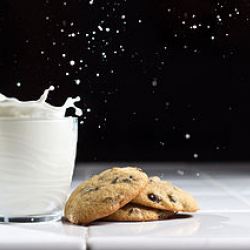As if Texas didn't have enough to deal with after hurricane Harvey, there's now a problem that is, at least, preventable - brucellosis from drinking raw milk. The CDC said that raw milk from the K-Bar Dairy in Paradise, TX, has tested positive "for a rare but potentially serious bacteria known as Brucella RB51."
According to the Mayo Clinic, brucellosis is typically passed from animals to humans. Its symptoms can include fatigue, fever, cardiomyopathy, and joint pain that can become chronic. Even when treated with antibiotics, it can take months for the symptoms to disappear. From the CDC:
If not treated, Brucella RB51 infection can result in long-term complications, like arthritis; heart problems; enlargement of the spleen or liver; and, in rare cases, nervous system problems, like meningitis RB51 can cause severe illness in people with weakened immune systems and miscarriages in pregnant women.
Thus far, the CDC says, one woman in Texas has been reported ill, but people from California, Arkansas, Ohio, and Tennessee and North Dakota may also be at risk and require antibiotic treatment. In Texas alone, over 800 households are known to have purchased raw milk from this dairy, but the CDC has not been able to reach about 200 of them, so they may be unaware of the risk.
The particular strain of Brucella — the RB51 — is an attenuated strain of the bacterium that's used to vaccinate young heifers. Brucellosis can cause abortions in cattle and related species, such as buffalo. Rarely, a vaccinated cow will shed RB51 in her milk. When the CDC tested milk from the K-Bar Dairy herd, they found two cows that were infected with RB51, and there might be more — testing is ongoing.
So why do people insist on drinking raw milk? And worse still, feeding it to their children who are more vulnerable to the effects of contamination? One reason is the perpetual misinformation promoted by various supposed "experts". For example, one website touts milk as "the perfect food" and supposedly we can exist on it alone.
Sorry, folks, it isn't true. Yes, infants need the nutrients in milk, but all milk is low in iron — even breast milk, by the way — and after the first couple of months when a baby can rely on the iron she's gotten from her mother in utero, her diet needs supplementation with iron.
Raw milk advocates also tout the supposed benefits of the active enzymes in raw milk, a claim that is without any merit whatsoever. All enzymes are made of protein, and when proteins encounter the acid and digestive enzymes in the human stomach they break down (a normal digestive process).
Yet another misleading statement is that before 1900 very few people died of heart disease. While this is true, it has little, if anything to do with the introduction of hydrogenated oils instead of the fats present in raw milk. People who lived during that time didn't die of heart disease because they often didn't live long enough to develop it — death from infectious disease was the norm — and some of those (such as tuberculosis) were passed along from drinking the raw milk from infected cows (pasteurization wasn't common until the 1920s).
And some people drink raw milk just because they prefer its taste. Yes, it's a free country, and if that's what you want to do, you can. But in my opinion, feeding raw milk to vulnerable youngsters is potentially a form of child abuse.
For more information about raw milk, take a look at the CDC's website.

